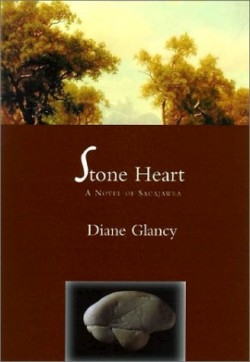Stone Heart
A Novel of Sacajawea
Following the trail of Lewis and Clark while researching this novel, the author came upon a white rock near Decision Point, the spot where a group of white explorers took the humble advice of Sacajawea, one of their interpreters and the only woman on their expedition. This real rock found its way into the fiction of this real woman, for it inspired her to create a dream for Sacajawea’s grandmother, a dream in which her newborn granddaughter is in need of a stone heart for the long journey she will undertake.
The danger of reading a historical novel is that fact and fiction become blended. Sacajawea’s place in United States history has already been shrouded in legend and mystery. Known as the indispensable guide for explorers Meriwether Lewis and William Clark and their Corps of Discovery, she actually played a small role in their two-year expedition following and mapping the Missouri River. This novel tries to remain true to the facts while at the same time imagining Sacajawea’s thoughts, resulting in a tale of a different kind of heroism.
The novel is told in second person, addressed to “you”-Sacajawea. Alongside her imagined observations are direct excerpts from the real journals of Lewis and Clark, creating a poetry as well as an unusual visual. (Perhaps the one fact a reader can be sure of is that Lewis and Clark were terrible spellers.)
The instances of Sacajawea as guide are few. There is one point, near the end of the roundtrip journey, in which Clark follows her advice, and takes a route through a mountain gap she remembers from her youth. She does interpret for the explorers, but when they set out from camp to see a beached whale, she must ask their permission to go along. She endures beatings from her husband, the French Canadian interpreter and fur trapper Toussaint Charbonneau, as well as numerous occasions of sickness and despair.
Her choices are hard ones, but they are, apparently, hers to make. Despite a reunion with her Shoshoni tribe, she does not stay, but moves on with the men, horses, and dogs of the Corps. Together, they endure overturned canoes, diseases, and storms. They exchange gifts during the “big medicine” of Christmas. Through their shared trials and triumphs, the Corps form a community, a family of sorts, and Sacajawea acknowledges that she belongs with them.
The author, who has received a Pushcart Prize and the American Book Award, is of Cherokee and German-English ancestry. Perhaps one of the most fascinating characters is Sacajawea’s son, Jean Baptiste, who, four years after the expedition, is adopted by Clark with the willing consent of his parents. More time could have been spent delving into the symbolic nature of this cross-cultural character, although it might have been difficult because he was so young. In any case, while the myth of Sacajawea as guide extraordinaire may be just that, the author asserts that her “leadership was in that inner, hidden life, that journey within as she traveled with the men away from her heritage.”
Reviewed by
Olivia Boler
Disclosure: This article is not an endorsement, but a review. The publisher of this book provided free copies of the book to have their book reviewed by a professional reviewer. No fee was paid by the publisher for this review. Foreword Reviews only recommends books that we love. Foreword Magazine, Inc. is disclosing this in accordance with the Federal Trade Commission’s 16 CFR, Part 255.

